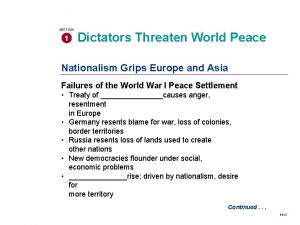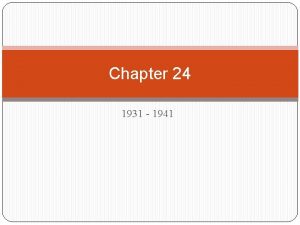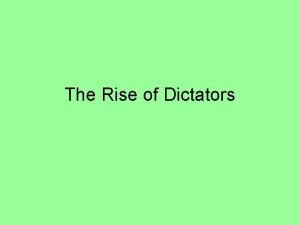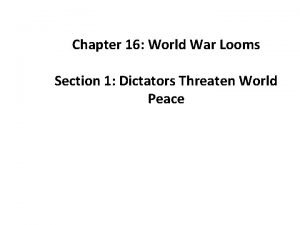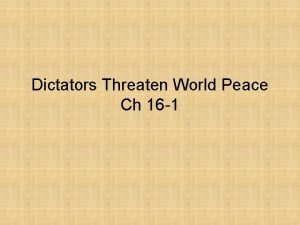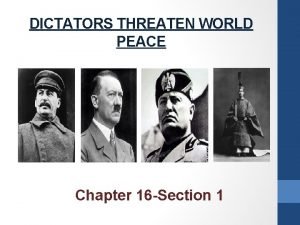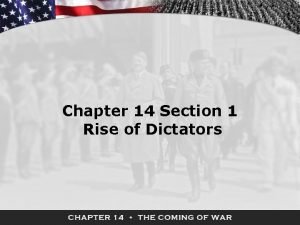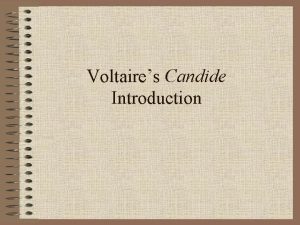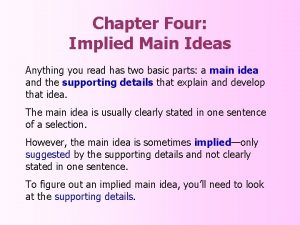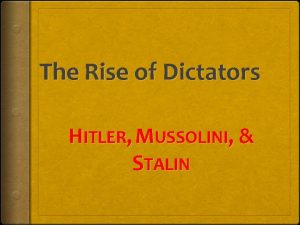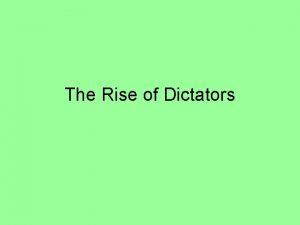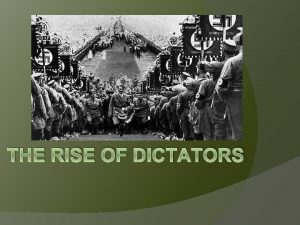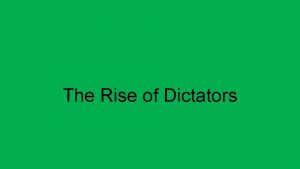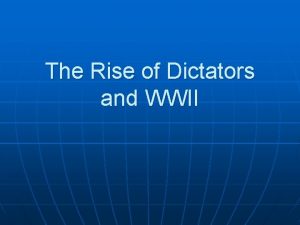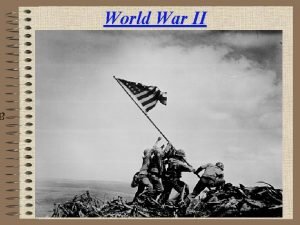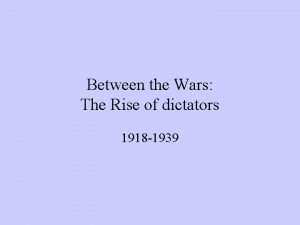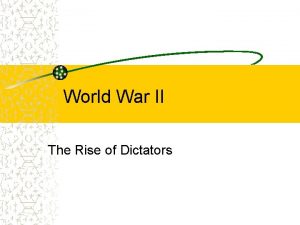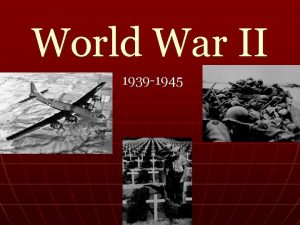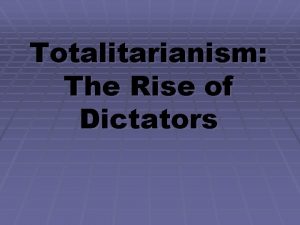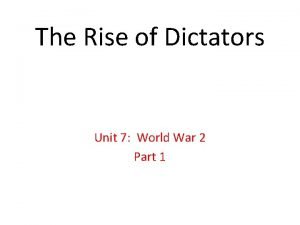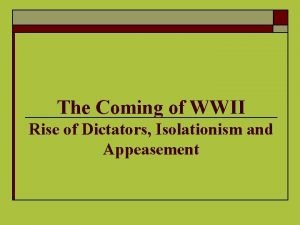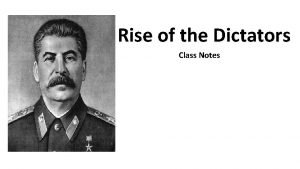The rise of Dictators Main ideas 1 2






















- Slides: 22

The rise of Dictators Main ideas 1. 2. Global depression during the 1930 s led to the rise of dictators in Europe and Asia. The rise of dictators was one of the causes of WWII.

Vocabulary n n n Totalitarian State: Government in which a one party dictatorship regulates every aspect of citizens’ lives. Dictator: Ruler who has complete control over a government. Fascism: A political regime where a military dominated government controls all aspects of society.

Adolf Hitler - Germany n n n Became Chancellor of Germany in 1932 by promising to restore Germany to greatness. Founded the Nazi Party. Set up a totalitarian and a Fascist government.

Hitler’s Policies Anti Semitism – Hatred of the Jewish people 2. - Prohibited Jews and non Nazis from holding government jobs Nuremberg Laws – 1935 Kristallnacht – 1938 2. Began to build up the German military, which was a violation of the Treaty of Versailles. 3. Began territorial expansion in 1936 by invading Rhineland. 1.

Joseph Stalin - Russia Became a leader in the 1920 s. n Set up a Communist and a Totalitarian government. n 1.

Stalin’s Policies n n n 1. Used the Red Army to crush the opposition. 2. Sent opponents to labor camps. 3. Signed a non aggression pact with Germany in 1939.

Hideki Tojo- Japan n Became the Prime Minister of Japan in 1941. Was committed to his nation’s expansion in the Pacific. Set up a totalitarian government

Policies of Japan’s military leaders n n n Wanted Japan to be less dependent on foreign imports. Planned to gain control over territories producing iron, rubber, and timber. 1931 – Japan attacked Manchuria 1935 – Japan begins military buildup 1937 – full fledged war between Japan and China Tojo was the most powerful government leader in Japan during WWII and approved the attack on Pearl Harbor as well as attacks in China, South East Asia and the Pacific.

Francisco Franco - Spain n n Became a dictator of Spain in 1936 with the help of Hitler and Mussolini. Set up a totalitarian and a Fascist government in Spain.

Benito Mussolini - Italy n n Established the Fascist Party in 1921. Marched on Rome with his followers. Government officials, the Army and the Police force sided with him…. so the Italian King stepped down and appointed Mussolini the head of the Government.

Mussolini’s Policies n n Began allying Italy with Germany. Limited freedom of speech, arrested political opponents and restricted voting rights. Pledged to make Italy an imperial power. Invaded Ethiopia in 1935.

Why did people support dictators? n n n Promise of growth and greatness Pride of Nationalism Global depression The harsh terms of the Treaty of Versailles and the reparations ruined the German economy. Hitler’s promises to restore Germany to greatness appealed to many Because of economic problems many people were more inclined to support strong leaders.

What made them dictators? n Authoritarian Rule n Desire for expansion n Totalitarian government

Causes of WWII

1. Rise of Dictators

2. Failure of the policy of Appeasement

What’s appeasement? n. Giving in to the aggressor in hopes that he will back away.

3. Failure of Collective Security n n n Kellogg Briand Pact – signed by 62 countries. Outlawed war as an instrument of national policy. Lacked enforcement mechanism. Gave everyone a false sense of security

Nonaggression Pact between the Soviet Union and Germany appeasement

4. Failures of the Treaty of Versailles n n n The Treaty of Versailles was flawed in that its major purpose was to punish Germany lost land, had to disarm and was ordered to pay $33 billion in reparations to the Allied powers. RESULT? Germany’s economy suffered, allowed Hitler to come to power.

German kids playing with money

Immediate cause of WWII n Hitler’s invasion of Poland in September of 1939.
 Rise of dictators graphic organizer
Rise of dictators graphic organizer Rise and rise again until lambs become lions origin
Rise and rise again until lambs become lions origin Sheep become lions
Sheep become lions Tricky dick
Tricky dick Rise and rise again until lambs become lions
Rise and rise again until lambs become lions Chapter 24 world war looms
Chapter 24 world war looms Dictators threaten world peace
Dictators threaten world peace Dictators threaten world peace
Dictators threaten world peace Roman dictators
Roman dictators Dictators threaten world peace
Dictators threaten world peace Chapter 16 building vocabulary world war looms
Chapter 16 building vocabulary world war looms Chapter 16 dictators threaten world peace
Chapter 16 dictators threaten world peace Chapter 16 dictators threaten world peace
Chapter 16 dictators threaten world peace Chapter 14 section 1 dictators and war
Chapter 14 section 1 dictators and war Que son las ideas complementarias
Que son las ideas complementarias Ideas have consequences bad ideas have victims
Ideas have consequences bad ideas have victims Identifying the topic sentence
Identifying the topic sentence Big ideas
Big ideas Renaissance humanism main idea
Renaissance humanism main idea Candide
Candide What is an implied main idea
What is an implied main idea Main ideas definition
Main ideas definition Ideas of john locke
Ideas of john locke






